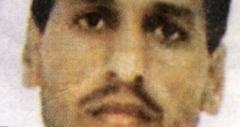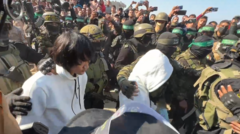As the 60-day deadline for troop withdrawal passes, Israeli forces in southern Lebanon reportedly killed at least 15 people, injuring over 80, as displaced civilians attempted to return home. The cease-fire, signed in November, aimed to curb hostilities between Israel and Hezbollah, but Israeli military presence remains a threat, exacerbating fears of renewed conflict.
Violence Erupts in Southern Lebanon as Troop Withdrawal Deadline Passes

Violence Erupts in Southern Lebanon as Troop Withdrawal Deadline Passes
Tensions escalate in southern Lebanon as Israeli forces defy cease-fire agreements, leading to civilian casualties and regional instability.
The violence unfolded after Israeli forces launched attacks on civilians while troops continued to occupy areas in southern Lebanon. Despite prior warnings from Israel urging locals to stay away, many residents began returning to the devastated towns of Aita al-Shaab and Nabatieh. Lebanese officials have condemned the military actions, emphasizing the urgency for a restored peace and denouncing Israel's alleged violations of the truce.
The Israeli military justified its actions as precautionary measures, claiming to have fired “warning shots” at suspected threats near their forces. The Lebanese Army, meanwhile, has been deployed to accompany civilians attempting to reach their homes, resulting in a heavy toll on both sides, including civilian and military casualties.
Foreign observers and local politicians are now braced for the unfolding crisis, with implications for the power dynamics involving Hezbollah, the dominant military force in Lebanon. The ongoing military presence of Israel could potentially rekindle support for Hezbollah amid rising resentments against Israeli actions and pressure to consolidate Lebanon’s sovereignty.
Lebanon’s leadership faces critical challenges as it strives to reinstate order amid this violence while managing pressures from both Hezbollah and external influences. Any prolonged occupation risks reviving the narrative of resistance against Israeli forces, thereby further complicating an already fragile political climate.
The situation remains precarious, with negotiations ongoing and the possibility of escalated violence looming. Countermeasures, humanitarian responses, and the potential for diplomatic intervention will all be crucial in determining the future stability of Lebanon and its relationship with Israel.
The Israeli military justified its actions as precautionary measures, claiming to have fired “warning shots” at suspected threats near their forces. The Lebanese Army, meanwhile, has been deployed to accompany civilians attempting to reach their homes, resulting in a heavy toll on both sides, including civilian and military casualties.
Foreign observers and local politicians are now braced for the unfolding crisis, with implications for the power dynamics involving Hezbollah, the dominant military force in Lebanon. The ongoing military presence of Israel could potentially rekindle support for Hezbollah amid rising resentments against Israeli actions and pressure to consolidate Lebanon’s sovereignty.
Lebanon’s leadership faces critical challenges as it strives to reinstate order amid this violence while managing pressures from both Hezbollah and external influences. Any prolonged occupation risks reviving the narrative of resistance against Israeli forces, thereby further complicating an already fragile political climate.
The situation remains precarious, with negotiations ongoing and the possibility of escalated violence looming. Countermeasures, humanitarian responses, and the potential for diplomatic intervention will all be crucial in determining the future stability of Lebanon and its relationship with Israel.























